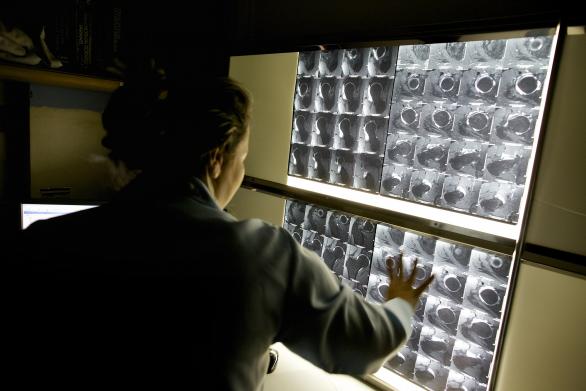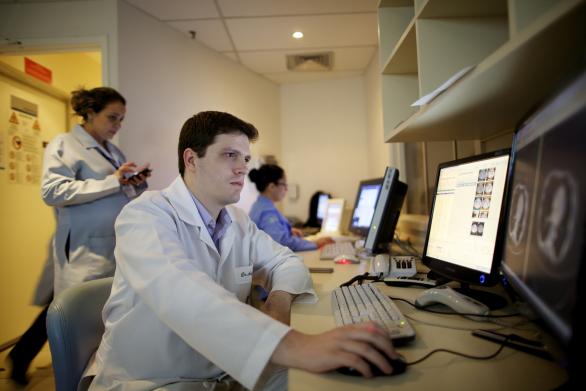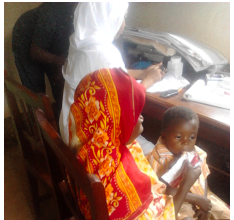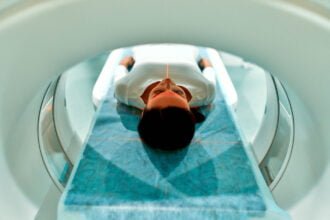Medical Solutions Magazine recently sat down with Dr. Romeu Domingues, Chairman of DASA, the largest diagnostics company in Brazil. Created through the fusion of some of the most traditional Brazilian laboratories and imaging providers, DASA performs over 200 million exams every year. Read how DASA meets the country’s growing healthcare needs.
Medical Solutions Magazine recently sat down with Dr. Romeu Domingues, Chairman of DASA, the largest diagnostics company in Brazil. Created through the fusion of some of the most traditional Brazilian laboratories and imaging providers, DASA performs over 200 million exams every year. Read how DASA meets the country’s growing healthcare needs.
Rio de Janeiro radiologist Romeu Domingues, MD, faces considerable logistical and entrepreneurial challenges: How to create a unified corporate culture across the 26 brands of DASA, the largest diagnostics company in Brazil and Latin America. DASA’s team includes over 20,000 employees and more than 2,000 doctors.
Dr. Domingues, who heads DASA’s administrative council, describes his vision for the company and how a strong partnership with Siemens helps to achieve his goal of an innovation-based, high-quality, and high-productivity corporation.
Medical Solutions: How hard is it to deal with 26 different brands and the various kinds of clients they entail?
Domingues: One of DASA’s peculiarities is the fact that we’re dealing with four different market segments. 74 percent of our revenue comes from private patients – including both payments in cash and patients that have insurance plans. 10 percent come from our “lab to lab” or “B to B” work: Small labs that send their more complex exams to us. Next, we have the private hospitals, around 80 of them, for which we perform exams. And, finally, seven percent of our revenue comes from the public health system, and it’s a pity it’s just seven percent. When we manage to get a public contract, it’s very gratifying because we can offer the same exam, with the same quality, for a patient that lives in a fancy neighborhood and for one who lives in the favelas.
Why is it important for you to work with the public sector?
The profit margins we manage to get in the public health system are smaller. On the other hand, there’s our sense of social responsibility, and it helps us to generate an economy of scale. After all, we’re now the largest diagnostic lab in Latin America. We do more than 200 million exams per year, which is more than three times the number of our closest competitor. Scale is very important when you’re going to automate a central lab like the one we have in Rio, where we do five million fully automated exams. When you’re going to negotiate with a provider to buy software or to arrange maintenance, scale matters. On the social responsibility front, we are very proud of a project called Imagem Solidária [Solidarity Imaging] that is working beautifully. We established a clinic for low-income patients in the Jesuit school I went to as a kid in Rio. We have magnetic resonance imaging, ultrasound systems, and mammography, producing exams with quality that’s undistinguishable from the quality we offer to the patients from fancy private practices. This year, Siemens in São Paulo also organized an effort, together with some of its other partners, such as Hospital do Coração and Hospital Sírio-Libanês, to offer a number of free examinations [more than 100 MRIs and about 100 computed tomography scans, in DASA’s case] to public hospitals in São Paulo State.

DASA has a strong interest in research and innovation. What are the benefits of that approach for your company?
We can’t afford not to invest in innovation, in new technologies, in being a pioneer. An examination as such, be it a blood test or a knee MRI, is just a commodity. If I need to negotiate a raise in reimbursement with an insurance company, I usually barely manage to compensate for last year’s inflation. So, how does our business stay afloat in the long run? Only with innovation.
In sum, that’s the approach we have to pursue, and it’s pretty great to see that, in the past five years, half of the papers presented by Brazilians at the RSNA [Radiological Society of North America] meeting in Chicago, were by our group. Why? Because we have residents, we have fellows, a good team of medical physicists, and a partnership research agreement with Siemens: As soon as new software is available, they let us know, we test it, and then publish the results. We can’t afford to lose this pioneer spirit.

In what sense do you think your partnership with Siemens has boosted your performance when it comes to offering innovative exams?
When I look at the MRI field, which is my specialty, I can say that, in the past ten years, Siemens really leapt ahead in technology, with several important innovations. It was the first company to bring full-body MRI to the market, with the possibility of connecting several coils at the same time. The first to devise a 70-centimeter, Open Bore magnet. The first to have simultaneous MR∙PET. It was clearly a huge investment in research that has paid off in terms of market share.
DASA operates on such a big scale that you also need to aim for the highest possible productivity. Is your collaboration with Siemens an asset in raising productivity levels, too?
One thing we realized right away was Siemens’ increasing concern with high productivity when it started manufacturing MRI equipment where you could use several coils at the same time, for example. You have to remember that, not so long ago, if you had to scan a patient’s spine and then his knee, you needed to reposition the coils. Nowadays, you don’t need to touch the patient. It may not sound like much, but that kind of thing results in much higher productivity.
Interview: Reinaldo José Lopes
More content and articles of interest are featured in the Medical Solutions Online Magazine: http://sie.ag/1mBdSLB
The statements by Siemens’ customers described herein are based on results that were achieved in the customer’s unique setting. Since there is no “typical” hospital and many variables exist (e.g., hospital size, case mix, level of IT adoption) there can be no guarantee that other customers will achieve the same results.








